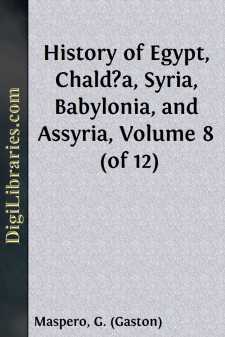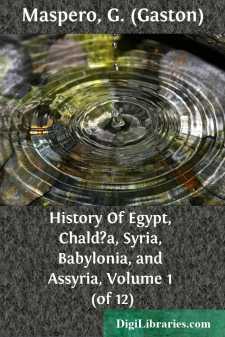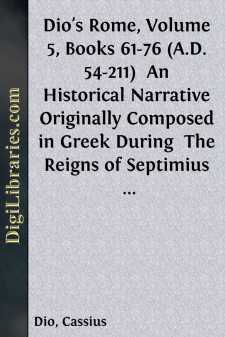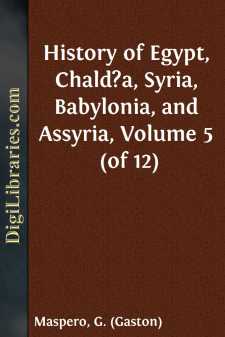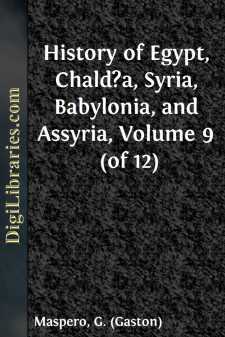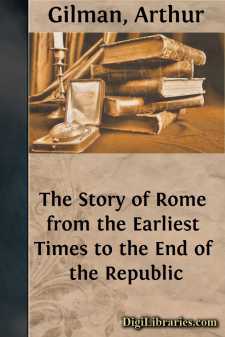History
- Africa 30
- Americas (North Central South West Indies) 50
- Ancient
- Asia 58
- Australia & New Zealand 8
- Canada 41
- Caribbean & West Indies 1
- Civilization 20
- Eastern Europe 12
- Europe 310
- Expeditions & Discoveries 60
- General 77
- Historical Geography 1
- Jewish 9
- Latin America 3
- Medieval 8
- Middle East 13
- Military 248
- Revolutionary 8
- Study & Teaching 5
- United States 353
- Western Europe 56
- World 13
Ancient Books
Sort by:
CHAPTER I—SENNACHERIB (705-681 B.C.) The struggle of Sennacherib with Judæa and Egypt—Destruction of Babylon. Sennacherib either failed to inherit his father's good fortune, or lacked his ability.* He was not deficient in military genius, nor in the energy necessary to withstand the various enemies who rose against him at widely removed points of his frontier, but he had neither the...
more...
EDITOR'S PREFACE Professor Maspero does not need to be introduced to us. His name is well known in England and America as that of one of the chief masters of Egyptian science as well as of ancient Oriental history and archaeology. Alike as a philologist, a historian, and an archaeologist, he occupies a foremost place in the annals of modern knowledge and research. He possesses that quick...
more...
by:
Cassius Dio
DURATION OF TIME M. Asinius Marcellus, Manius Acilius Aviola. (A.D. 54 = a.u. 807 = First of Nero, from Oct. 13th). Nero Caesar Aug., L. Antistius Vetus. (A.D. 55 = a.u. 808 = Second of Nero). Q. Volusius Saturninus, P. Cornelius Scipio. (A.D. 56 = a.u. 809 = Third of Nero). Nero Caesar Aug. (II), L. Calpurnius Piso. (A.D. 57 = a.u. 810 = Fourth of Nero). Nero Caesar...
more...
THE ESTRANGER In the effort to dull the edge of his mental anguish by physical exhaustion Catullus had walked far out from the town, through vineyards and fruit-orchards displaying their autumnal stores and clamorous with eager companies of pickers and vintagers. On coming back to the eastern gate he found himself reluctant to pass from the heedless activities of the fields to the bustle of the town...
more...
MESOPOTAMIA.—THE MOUNDS.—THE FIRST SEARCHERS. 1. In or about the year before Christ 606, Nineveh, the great city, was destroyed. For many hundred years had she stood in arrogant splendor, her palaces towering above the Tigris and mirrored in its swift waters; army after army had gone forth from her gates and returned laden with the spoils of conquered countries; her monarchs had ridden to the high...
more...
CHAPTER I. ITALY. I am going to tell you next about the most famous nation in the world. Going westward from Greece another peninsula stretches down into the Mediterranean. The Apennine Mountains run like a limb stretching out of the Alps to the south eastward, and on them seems formed that land, shaped somewhat like a leg, which is called Italy. Round the streams that flowed down from these hills,...
more...
CHAPTER I—THE EIGHTEENTH THEBAN DYNASTY—(continued) Thutmosis III.: the organisation of the Syrian provinces—Amenothes III.: the royal worshippers of Atonû. In the year XXXIV. the Egyptians reappeared in Zahi. The people of Anaugasa having revolted, two of their towns were taken, a third surrendered, while the chiefs of the Lotanû hastened to meet their lord with their usual tribute. Advantage...
more...
CHAPTER I—THE IRANIAN CONQUEST The Iranian religions—Cyrus in Lydia and at Babylon: Cambyses in Egypt —Darius and the organisation of the empire. The Median empire is the least known of all those which held sway for a time over the destinies of a portion of Western Asia. The reason of this is not to be ascribed to the shortness of its duration: the Chaldæan empire of Nebuchadrezzar lasted for a...
more...
by:
Arthur Gilman
ONCE UPON A TIME. Once upon a time, there lived in a city of Asia Minor, not far from Mount Ida, as old Homer tells us in his grand and beautiful poem, a king who had fifty sons and many daughters. How large his family was, indeed, we cannot say, for the storytellers of the olden time were not very careful to set down the actual and exact truth, their chief object being to give the people something to...
more...
by:
Cassius Dio
BOOK 78, BOISSEVAIN.) [Sidenote: A.D. 211 (a.u. 964)] [Sidenote:—1—] After this Antoninus secured the entire power. Nominally he ruled with his brother, but in reality alone and at once. With the enemy he came to terms, withdrew from their country, and abandoned the forts. But his own people he either dismissed (as Papinianus the prefect) or else killed (as Euodus, his nurse, Castor, and his wife...
more...


